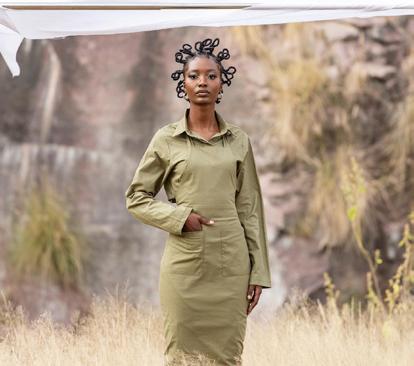

In Memoriam of Mercy Adundo
A life short lived but well lived. Creative extraordinaire and Senior Editor at TAP, Mercy was an award-winning creative force with a profound passion for captivating imagery and compelling narratives.
With over a decade’s experience in the film industry, her work shines in numerous productions such as ‘Nairobi Half Life’, ‘Kina’, ‘Chaguo’, ‘Vanishing Vultures’, ‘ Pepeta’ and ‘Country Queen’ which have been shown on Netflix, M-Net and other global media platforms. She also elevated the standard of TAP’s audio-visual productions.
Mercy, thank you for your friendship, support and work. We will always remember your dedication to our craft and community.
Rest Well
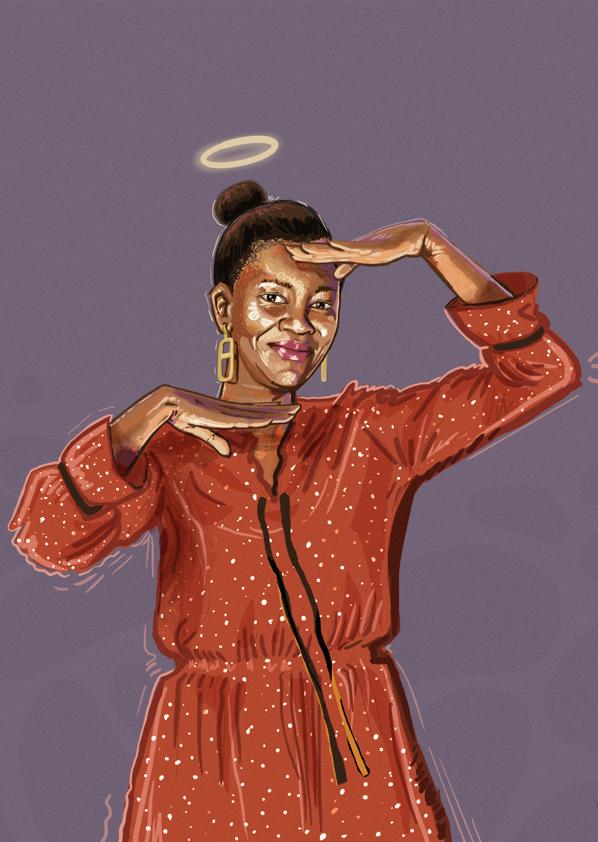


Editor in Cief
Photographer / Creative Consultant Country Coordinator
P aul k ide R o
s ha MM e R a gila
Video Production / Editor
n ahla a bass
Contributor & Production Assistant Copy Editor
l ilian a si M ba
M voi k igondu
Magazine Design & Layout
P aul k isuche
Illustrations
M oses (R as ) M utaba R uka W innie M ills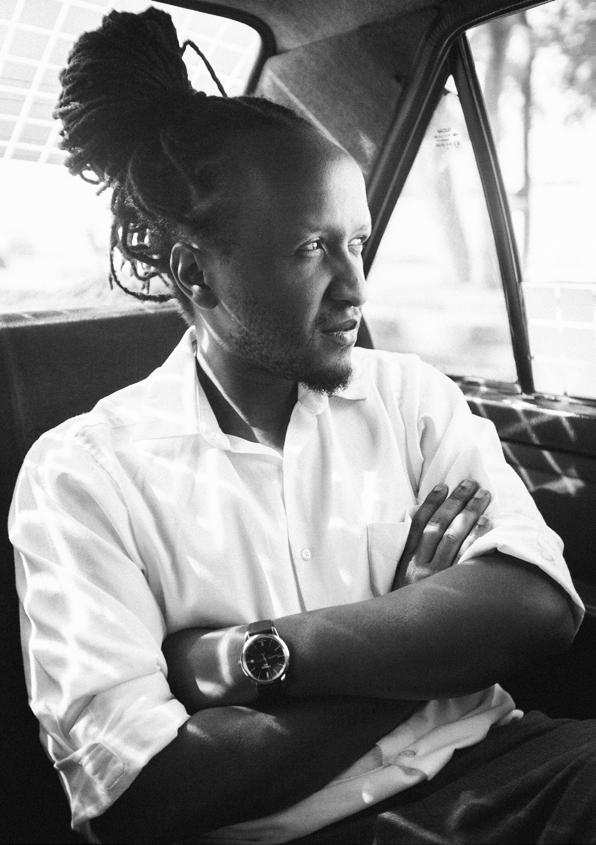
 Cover illustration by Paul Kisuche @kisuche_
Cover illustration by Paul Kisuche @kisuche_
AFRICA’S DIASPORA YOUTH RETURNS
Dear TAP Fam,
Warm greetings from a cold and flooded Nairobi! I hope that wherever you are, you’re keeping safe and taking good care of yourself and your loved ones.
We are delighted to be publishing the 19th issue of TAP Magazine in what we hope will be a milestone year for this magazine. As a publication founded by a young man out in the diaspora, and that has since made a complete exodus back to the continent, we’re thrilled to be dedicating this specific issue purely to stories of enterprising young Africans who have left it all behind in the west and returned to the continent.
For the past decade, migration has been one of the leading political issues across the Western World. In Europe, many people live in paranoia of African migrants swimming onto their shores and taking over their villages, towns, cities, and countries; but most importantly, their jobs and way of life. This fear has led to the resurgence of extreme far-right groups, politicians, and political parties. Using fear, they have taken the opportunity to incite division and hate amongst the doubtful mass
It is probably worth mentioning that contrary to popular belief, the number of Africans moving outside Africa (per population) has not increased at all since the 1960s. When they do move, half of all Africans who leave their countries of origin end up in another African country and not anywhere across Europe, Asia or North America.
The African Union defines the African diaspora as “people of African Origin who live outside the continent, and who, irrespective of their current nationality or citizenship, are willing to contribute to the development of the continent and the African Union. This definition encompasses all African migration; historic, current, forced, voluntary, economic or humanitarian”.
With an estimated 350 million people of African descent living in the diaspora, it’s been fascinating to see that a lot more African people are now choosing to return to the continent after years abroad.
So why is it that more and more young African youth are choosing to leave the West and move back to Africa? Beyond systemic barriers that prevent most of these youth from fully actualizing their potential, the next generation of young people across the globe aren’t comfortable just working for a paycheque in general. They want to feel that the work they do is valuable and impactful to real people. They want to be part of the continent’s rebirth.
In this issue, we share the stories of seven young African women who’ve made the journey back to the continent. The seven profiles were part of our series titled “Homecoming” that interviewed over 50 young people who’ve moved back to the continent and produced 28 Television episodes for Deutsche Welle.
If you know of any young person in the diaspora who has been thinking about moving back to the continent, make sure you share the issue with them.
Special thanks to the entire TAP team, to all our contributors and to everyone else who helped in making this issue possible.
As always, grateful for your support.
We Move!!
MOSES “RAS” MUTABARUKA Editor-in-Chief, TAP Magazine


 Allen Kendunga
Daniella Kwayu
Frances Quarcoopome
Allen Kendunga
Daniella Kwayu
Frances Quarcoopome




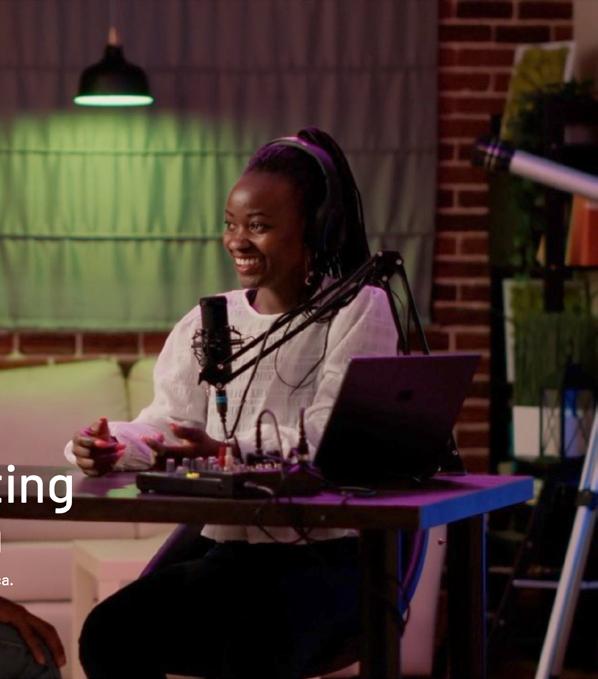


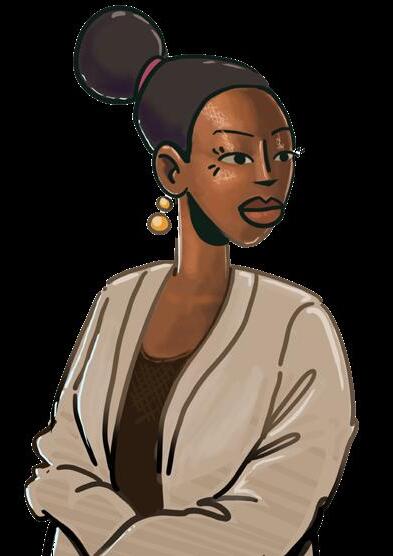
Allen Kendunga Returning Home to Put Young Africans to Work
In the heart of Rwanda’s burgeoning business landscape, Allen Kendunga’s journey stands out. Born in Uganda to Rwandan parents, Allen’s return to Rwanda after years abroad marked a pivotal moment.
With a keen eye on bridging the skills gap among young graduates, she founded Talent Match, a platform dedicated to career guidance and entrepreneurship development.
Talent Match isn’t just about preparing students for jobs; it’s about nurturing their entrepreneurial spirit. Through innovative programs, Allen and her team empower graduates to not only enter the workforce but also to create their ventures.
This dual approach has sparked a wave of innovation and readiness among Rwanda’s youth, positioning Talent Match as a catalyst for change in the country’s evolving workplace landscape.
Allen’s story serves as a beacon for those considering returning home to make a difference. Her advice is simple yet profound: follow your heart, start small, and let passion drive your journey.
In Allen Kendunga’s homecoming odyssey, we find a compelling narrative of making a lasting impact on society.
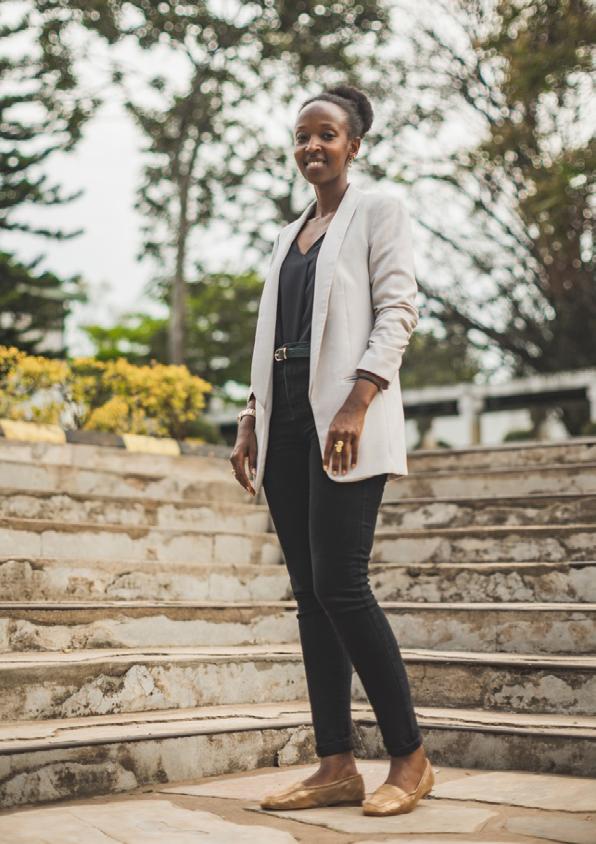
Introduce yourself
My name is Allen Kendunga and I’m the founder of talent match. I was born in Uganda, My parents moved there to seek safety like many Rwandan families. I moved back to Rwanda after the 1994 genocide
How was life growing up as a Rwandan child in Uganda?
Growing up, at home, we primarily spoke Kinyarwanda, and discussions often revolved around our experiences and family history. Although my grandparents resided in Rwanda, I didn’t have direct contact with them. However, my parents shared stories of their journeys between Tanzania and Rwanda, offering glimpses into our heritage.
The emphasis on organization and cleanliness in Rwandan households, particularly instilled by my mother, left a lasting impression on me. I perceived it as a defining trait of Rwandan families, contributing to my understanding of cultural values. Despite our strong Rwandan upbringing, venturing outside our home introduced me to new adventures and experiences, fostering a sense of curiosity and adaptability.
This upbringing shaped my perception of identity and cultural appreciation. Each day brought its own sense of wonder and uniqueness, blending familiar routines with the excitement of exploration. Ultimately, coming home served as a reminder of our roots and the essence of who we are
What are some of the fondest memories you keep from those days?
Growing up surrounded by mostly boys was an adventure I often reflect on. As the second youngest in a family of boys, I quickly learned the dynamics of living among boys - the camaraderie, the challenges, and the playful teasing. Despite the expectations and occasional kicks on the soccer pitch, I found myself becoming more fearless and adaptable.
Playing soccer with the older boys was both exhilarating and challenging. Even though I was always the smallest, I held my ground, facing tackles and playful roughhousing with determination. Standing up for myself, even in those playful fights with my older brother, I carry with me valuable lessons in resilience and self-advocacy.
Looking back, those moments of competitiveness and camaraderie shaped my character and fueled my love for adventure and sports. Growing up amidst such experiences was undeniably fun and formative, laying the foundation for the fearless spirit I carry today.
When you first moved to Rwanda as a teenager, did you experience any culture shock?
II used to say that growing up in Uganda I felt like I was a stranger, but surprisingly, you come and then you also feel like
there’s a culture shock suddenly. You’re a stranger at home. For example, I thought I knew Kinyarwanda when I came, I really thought I spoke Kinyarwanda but my Kinyarwanda was not the Kinyarwanda everybody spoke.
That said, there was also a bit of excitement knowing that I’m home,no one will call me a “Rwandan” because we are all Rwandans. I was also excited to see my grandmother, my uncles, my aunties,I was generally happy to be in a place where I didn’t have to think about and constantly be reminded of my identity as the “other’, as a Rwandan.
How was Talent Match started?
At Talent Match, our mission is clear: bridge the gap between young graduates’ skills and employers’ expectations. We’ve identified a pressing issue - a mismatch between what students offer and what employers seek. This gap stems from rapid changes in Rwanda’s education system, leaving graduates underprepared for the workforce’s demands.
My experiences during internships highlighted these challenges. Instead of nurturing talent, many workplaces sidelined eager learners. This realization fueled the inception of Talent Match. Our focus is on cultivating work-ready graduates, not just academically, but also in terms of practical skills and mindset.
Through our career services, we mold students into adaptable professionals, addressing the skills gap head-on. We engage with employers to understand their needs, ensuring our graduates seamlessly integrate into the workforce. By complementing formal education with hands-on training and employer collaboration, Talent Match is revolutionizing how Rwanda prepares its future workforce.. Today, we’re based on the campus of the University of Rwanda and we serve more than 10,000 students.
Was America really the promised land like people assume?
Generally people have a perception of what America is I think because of television and media, but when you get there you see reality, you see both sides to the story which you don’t get when you’re not there. And so I think for me getting there opened my eyes to the real deep realities.
America is a powerful country, it’s beautiful, it’s rich, it has brilliant people, but it also has its own issues. It has poverty, it has homelessness, it has racism, and many many other issues. And I think for me going there really made me learn that there’s two sides to every story. I was mind blown by the development, all the big highways and stuff. But I was also shocked at how much need they also have.
Any takeaways from the time in America?
Studying and living in America profoundly impacted my perspective. While formal education is valuable, my real growth happened outside the classroom. America’s vast
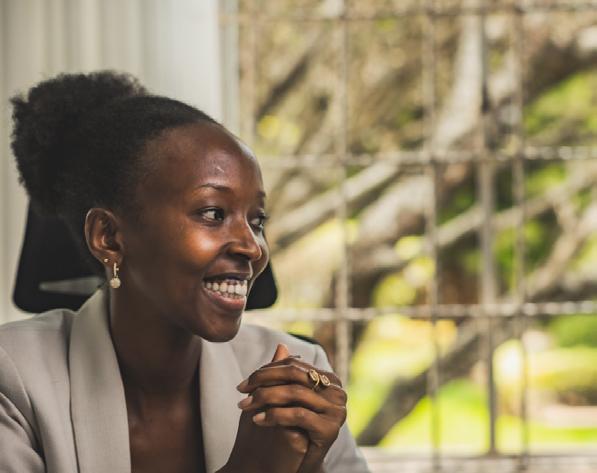
diversity exposed me to myriad cultures, lifestyles, and perspectives. Traveling within the country felt like traversing multiple nations, each offering unique experiences.
This exposure taught me the importance of diversity and acceptance. I learned to appreciate people for who they are, recognizing that everyone’s journey is different. Embracing my background and values became a cornerstone of my identity. Meeting individuals with diverse backgrounds and beliefs grounded me, making me grateful for the richness of my own heritage.
Living in America was not just about gaining knowledge but also about self-discovery and appreciation for my roots. It’s a journey that continues to shape my understanding of the world and myself.
What would be your advice to those considering moving back home?
My advice to those contemplating a move back home is simple:
• Follow your heart and let passion drive your journey.
• Regrets often stem from missed opportunities, not failed attempts. Even if things don’t go as planned, every experience is a stepping stone towards growth.
• Start small. Starting small is not a setback but a strategic advantage. Talent Match began with just a handful of individuals and has now expanded to impact thousands. It’s through these humble beginnings that we learn, adapt, and discover our true potential.
• Embrace the journey of discovery. Test the waters, learn from failures, and pivot when necessary. Every setback is a lesson, and every success is a milestone. In the end, what matters most is the courage to pursue your dreams and the resilience to keep moving forward.
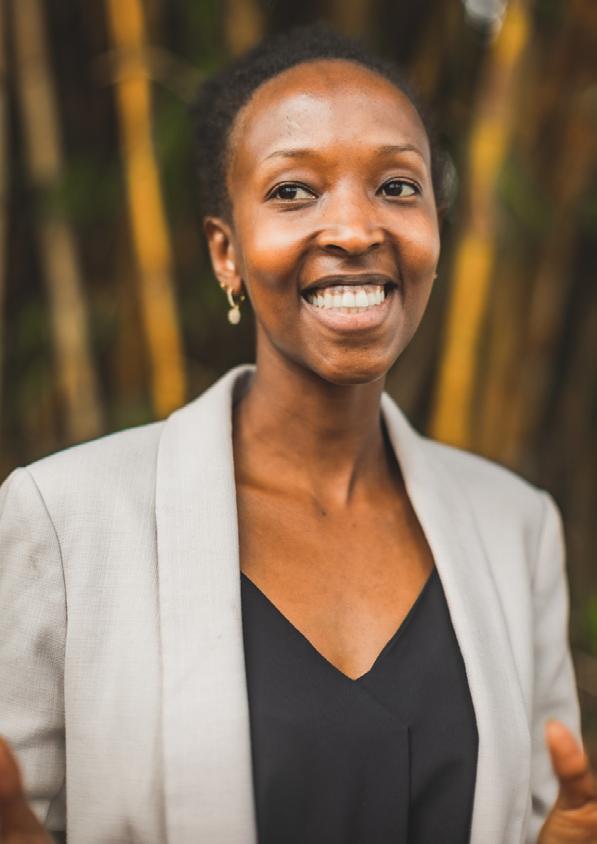



Daniella Kwayu
Reshaping Tanzania’s Agricultural Landscape
In the bustling landscape of modern entrepreneurship, certain stories stand out as beacons of inspiration and innovation. One such tale is woven by Daniella Kwayu, the visionary force behind Phema Agri, a groundbreaking initiative reshaping the agricultural landscape of Tanzania.
When she traveled to the USA to pursue a degree in international business at SUNY Plattsburgh, a small university in upstate New York, Daniella’s mind was already onto something.
Unlike many others, Daniella wasn’t set on living the American Dream. From the outset, she knew that her heart belonged back home, eager to implement the knowledge she’d gain from her education in the West. Thus, the day after her graduation, she booked the next flight back to Tanzania.
From humble beginnings to pioneering success, Daniella’s story is one filled with resilience, passion, and unwavering commitment to positive change.
Her journey serves as a testament to the transformative power of determination and vision in the realms of business and societal impact. When we met her in her office in Dar, she unraveled the layers of her remarkable narrative.
Introduce yourself to the TAP fam
My name is Daniella Kwayu and I am currently the founder and CEO of Phema Agri, that’s located here in Dar Es-salaam, Tanzania.
I’m an international business graduate and financial economist and I’ve worked in Finance for over ten years. I was born in Dar Es-salaam to a family of three but originally our family’s from Kilimanjaro region.
What was your childhood like?
Growing up in a young family primarily raised by a single mother, my childhood was defined by resilience and a sense of tough love. With my father passing away when I was just nine years old, and my mother instilled in us the strength to face challenges head-on.
Despite the hardships, one of my fondest memories from those early years was our Sunday ritual of going to church. While I often dreaded waking up early, my mother cleverly incentivized our attendance with a post-church treat - a bit of ice cream.
This small gesture not only made the church visits bearable but also became a cherished part of our weekly routine, fostering a strong bond within our family.
What are some of the lessons you learned from your mom growing up?
I’ve learned invaluable life lessons from her that have shaped my journey. Firstly, her resilience is awe-inspiring. As a single mother raising three children, she faced numerous challenges but never wavered in her determination. Her unwavering strength and ability to overcome obstacles have taught me the power of resilience in navigating life’s hurdles.
Secondly, my mother’s success in a male-dominated industry is a testament to the limitless potential of women. Despite the odds, she rose through the ranks to become one of the most respected figures in her field in Tanzania. Her achievements serve as a constant reminder that as women, we are capable of achieving incredible feats and making a significant impact in any industry.
Tell us more about your journey to America
My journey to the West was nothing short of a whirlwind adventure. Arriving in December 2009, amidst the winter’s icy grip, I embarked on a degree in international business at SUNY Plattsburgh, a charming university tucked away in upstate New York. It’s amusing to note that I found myself closer to Canada than to the bustling streets of New York City, a fact that never failed to elicit a chuckle from those I shared it with.
Despite the chilly reception, I dove headfirst into my studies and managed to complete my degree in a remarkable two
and a half years, defying the typical four-year timeline. This accomplishment was no small feat, and it speaks volumes about my dedication and perseverance.
Throughout my time in the West, I embraced my role as a “people person,” akin to a chameleon adapting to diverse environments. I immersed myself in different cultures, engaged with a myriad of individuals, and forged meaningful connections that endure to this day. These connections include mentors, teachers, and fellow adventurers who have enriched my journey and continue to inspire me on my path.
When did you decide you wanted to come back?
From the outset, my journey to the West was driven by a clear purpose: to equip myself with the knowledge and skills needed to effect positive change back home in Tanzania. This vision guided every decision I made, including my choice of degree in international business. Even during my time abroad, I remained focused on my ultimate goal, actively seeking job opportunities and conducting interviews back in Tanzania as I neared the end of my studies.
The desire to be based in Tanzania, to contribute to its growth and development, was always at the forefront of my mind. So much so that the day after my graduation, I wasted no time and boarded a flight back home.
What is PHEMA Agri?
Phema Agri is a marketplace essentially connecting smallholder farmers in Tanzania and in Africa as a whole, to investors and also connecting farmers products and harvest to businesses, that way they have a place to sell their produce and have access to financing. We help farmers produce more efficiently, access markets and access financing to grow their businesses and operations.
We launched it as a crowdfunding platform, but we’re pivoting from that and the aim is to be able to link investors who have an excess amount of money who are looking to invest, who are looking for credit worthy investment opportunities. We’re making farmers more credible so that they can get the funding and financing from these investors.
What would you say is the biggest problem that PHEMA Agri is working at solving?
After returning from my master’s program and gaining experience as a corporate analyst in the agriculture and FMCG sector at a major bank, I became acutely aware of a glaring issue: while 80% of the entire populations of Tanzania, around 53 million people are somehow involved in the agricultural sector, and while there’s close to 60 financial institutions in the country, less than 5% of their total financing goes to the agricultural sector. But that less than 5% of funding that goes into the sector, less than 1% goes out into smallholder farmers who make up 60% of the entire farming population.
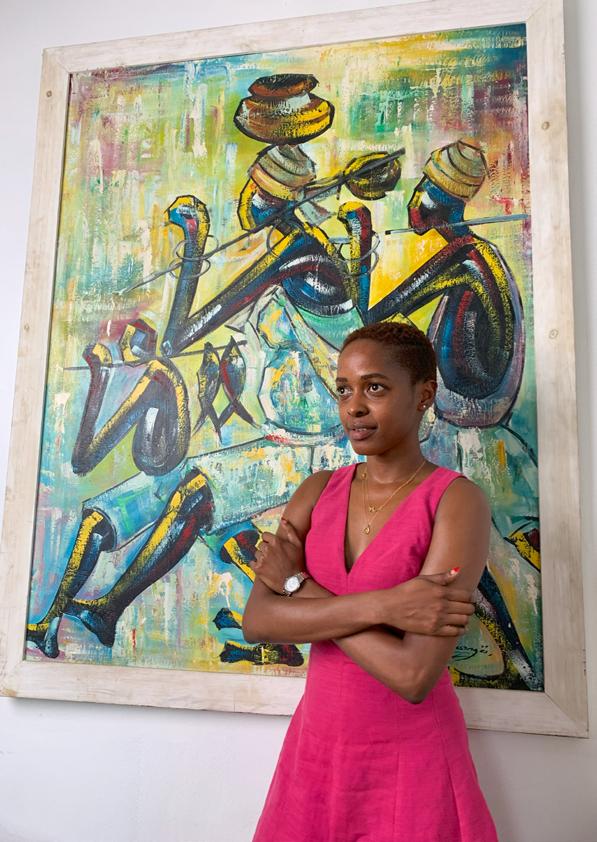
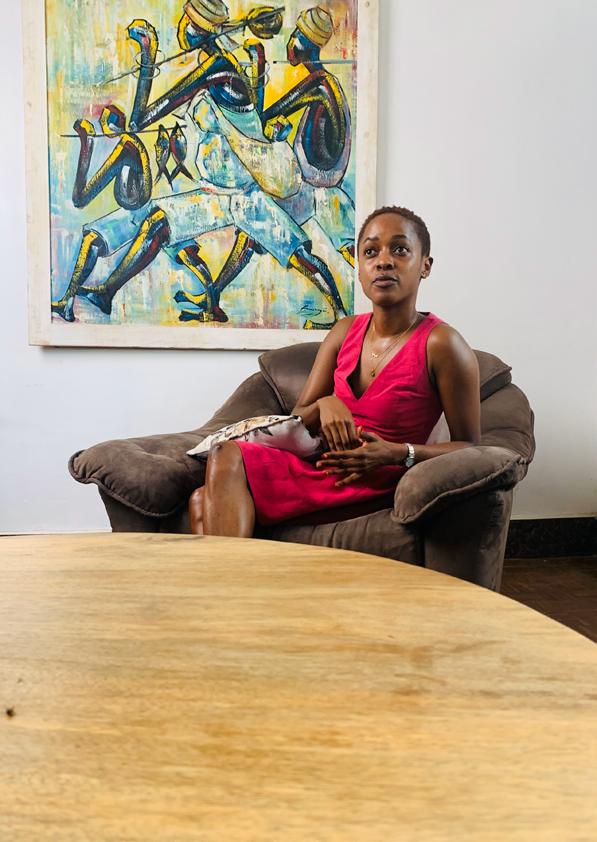
It is this realization that sparked the genesis of Phema Agri. Driven by the ethos of equitable distribution and sustainable growth, we envisioned a different approach—a financial instrument that could bridge the gap and empower smallholder farmers. It was a vision born out of necessity, a solutiondriven response to a systemic imbalance in the industry.
However, turning this vision into reality was no easy feat. It took us two years of rigorous testing, refining our ideas, and validating our product before we were ready to launch in 2019. This journey required dedication, perseverance, and a leap of faith as we made the decision to leave our corporate jobs behind and fully commit our time and energy to Phema Agri.
What are the issues at hand that make it difficult for banks to finance farmers?
There’s a level of risk that banks and anybody who’s investing in the sector perceives on farmers. First, farmers are not structured. They all scattered all around. They often lack the direct collateral to underpin a loan from a bank. From a traditional bank perspective, this is flagged as a risk, which means you’re either going to get a loan as a farmer when it’s high interest or you’re going to have a lot of different conditions you have to meet to make that loan possible, which becomes very hard for everyone involved.
Why did you choose agriculture?

to be able to survive? So being able to still fundraise and close out and sell out all our farms on that pilot was to me a testimony that this is possible.
And on the marketplace side, we started with four vendors and today we have about 400 on our platform. This is proof that the solutions we’re implementing on the ground are scalable. That’s a huge win for us. And thirdly, it’s through the different prizes we’ve won.
I often get asked, of all the things you could do, why Agriculture? The truth is, I didn’t think I would actually start my own company, let alone be in agriculture.
Biggest challenges encountered?
Access to capital, which is exactly why we exist, as a startup that is obviously one of the biggest challenges we face. It hasn’t been rousey, to leave the comfort of your job, which in my case wasn’t a bad paying job to take that leap. I think people underestimate the level of trust and faith that you need to be able to take that leap.
What are some of the highlights in PHEMA Agri?
The launch of the actual platform, this was right when COVID hit. It was a tough time. So do we still crowdfund? Are people actually interested in investing? They’re busy trying to save up because the future was kind of bleak then. You never knew, is this disease going to go? Are we going
What would be your advice for other young graduates thinking of coming back to Africa?
• Before embarking on any life-changing journey, it’s crucial to thoroughly understand the path you’re taking—considering everything from job opportunities to living conditions.
• Despite the allure of the West, I assure you, the growth potential back home surpasses it by leaps and bounds.
• For young entrepreneurs with a passion for innovation in various fields—be it creativity, finance, or agriculture—there’s an abundance of untapped potential waiting to be harnessed here.


Adan Fayruz
“For
the Love of Girls”:
A Journey of Passion & Impact
By Nahla AbassDid you know that 65% of girls and women in Kenya don’t have access to menstrual products, and another two-thirds of those receive them from sexual partners? Shocking, isn’t it? Now imagine this: around 1.2 million school-going girls are unable to access menstrual products, impacting their education, health, and dignity.
These mind-boggling statistics are just the tip of the iceberg in the realm of menstrual health challenges faced by women and girls in Kenya. However, amidst these stark realities, there shines a beacon of hope and empowerment.
Through her “For the Love of Girls” project, Fayruz Adan has been able to help women hide the ‘shame’ that comes with “period poverty”.
Her story is not just about numbers; it’s about dedication, and the transformative power of advocacy. Fayruz’s passion for women’s health, nurtured through academic pursuits and real-world challenges, has led her on a path towards sustainable solutions and impactful change.
Academic Foundation and Passion for Women’s Health
Fayruz’s academic journey began at the prestigious London School of Economics and London School of Hygiene & Tropical Medicine, where she pursued a master’s degree in Health Policy, Planning, and Financing.
Throughout her education, Fayruz consistently focused on women’s health, particularly maternal health, family planning, reproductive health, and related programs. Her academic endeavors culminated in a thesis specifically addressing maternal health and maternal mortality rates in Africa, showcasing her expertise and dedication to understanding and improving women’s well-being.
Unveiling the Issue of Period Poverty
One of the pivotal moments in Fayruz’s journey was the recognition of period poverty as a pressing issue affecting girls’ education and overall well-being.
Through her research and advocacy work, she uncovered startling statistics, such as over sixty days of school missed annually by girls due to their periods. This cumulative effect can lead to school dropout, early marriages, and long-term economic consequences, highlighting the urgency of addressing period poverty comprehensively
Initiating “For the Love of Girls”
Motivated by the significant impact of period poverty, Fayruz, along with her sister, initiated the “For the Love of Girls” project in 2019.
The project initially focused on distributing menstrual cups, recognizing their cost-effectiveness and environmental benefits.
However, cultural preferences prompted a shift towards reusable menstrual pads, aligning with the communities’ needs and ensuring sustainability.
Challenges and Adaptation during the Pandemic
The onset of the COVID-19 pandemic presented unforeseen challenges for the “For the Love of Girls” project.
Lockdowns and restrictions disrupted distribution channels, requiring innovative approaches to reach remote and marginalized communities in Kenya. Fayruz and her team adapted swiftly, leveraging crowdfunding and strategic partnerships to continue their mission of providing menstrual products and support to those in need.
Sustainable Solutions and Environmental Impact
Central to Fayruz’s advocacy is the emphasis on sustainability and environmental impact. She highlights that their reusable pads are six times cheaper than disposable pads over a fouryear period, showcasing not only economic benefits but also a reduced environmental footprint. The inclusion of organic, plastic-free materials in their menstrual kits underscores a commitment to eco-conscious practices.
Empowering Beyond Product Distribution
Fayruz’s vision extends beyond immediate product distribution. The “For the Love of Girls” project aims to provide mentoring, training, and long-term support for girls, empowering them economically and educationally. The initiative acknowledges the broader impact on future generations, recognizing that breaking the poverty cycle requires holistic interventions and sustained efforts.
Navigating Cultural Taboos and Societal Challenges
A significant aspect of Fayruz’s journey involves navigating cultural taboos and societal challenges surrounding menstrual health. She emphasizes the importance of addressing these taboos, promoting open conversations, and challenging stigma. Overcoming personal fears and cultural barriers within the Somali community was a hurdle Fayruz confronted, highlighting the transformative power of initiating conversations and breaking the silence around menstrual health. And in her case, having a family, and a father for that matter, that championed her cause.
Reflections on Impact and Future Directions
In reflecting on her journey, Fayruz emphasizes the importance of recognizing and addressing significant challenges in women’s health. While progress has been made, she acknowledges that much work remains to be done. Her advice centers on ongoing commitment, action, and advocacy to contribute effectively to improving women’s health globally.
A Call for Collective Action
Fayruz’s narrative extends beyond her individual journey; it’s a call for collective action. She encourages open discussions, awareness campaigns, and community engagement to tackle period poverty comprehensively. Her insights on the environmental impact of disposable menstrual products resonate with a growing movement towards sustainable practices and conscious consumption.
A Legacy of Empowerment
Through her unwavering dedication, Fayruz leaves a legacy of empowerment, resilience, and meaningful impact. Her journey exemplifies the power of passion, advocacy, and collaboration in driving positive change. As she continues her work with “For the Love of Girls,” Fayruz inspires others to join the movement towards a world where women and girls can thrive without barriers or limitations.
Fayruz’s Homecoming advice
• Ask yourself if you’re actually READY. You don’t want to come back if you’re not completely ready.
• Do everything you need to do where you are before you come back. Otherwise, you’ll have regrets

Quarcoopome Frances
Embracing Heritage & Entrepreneurship
MIn a world marked by cultural diversity and entrepreneurial fervor, Frances Quarcoopome’s story stands out as a testament to embracing heritage and chasing one’s dreams.
Born in the United Kingdom to Ghanaian and English parents, Frances embarked on a journey that led her back to her roots in Ghana, where she now thrives as the founder of one of Africa’s biggest creative agencies.
We met Frances in Accra, a day after curating the National Football League (NFL) first ever foray into the continent and she was kind enough to share her insights, challenges, and triumphs, offering a glimpse into her fascinating life and career.

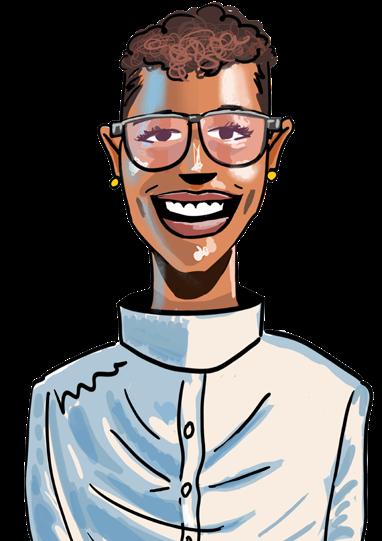
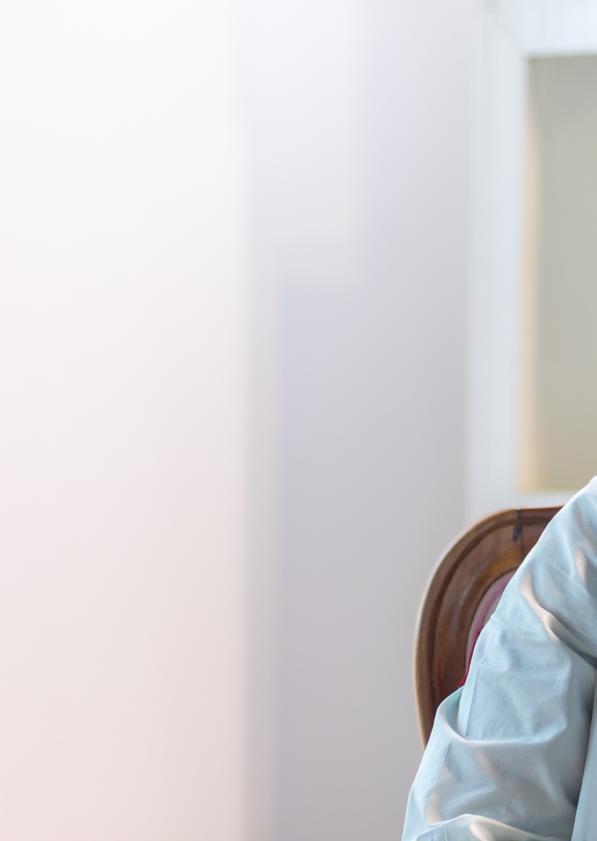
Evolution of a Vision: From Rooftop Parties to Jam Jar
Frances’s journey into entrepreneurship unfolded organically. Starting with rooftop parties and working with a development agency, she eventually founded Jam Jar, an events agency that has garnered acclaim for its creativity and local solutions.
Jam Jar was founded in 2013, and as Frances puts it, it has been a really interesting journey over the years this is because she is interested in seeing her own growth trajectory.
“Founding Jam Jar has been one of the things that when I look back, I am like, wow, everything sort of fell into place from working in bars and restaurants in the UK to running a bar in Ghana,” said Frances.
She also explained that Jam Jar wasn’t her first venture to set up when she moved back home. “I was iworking with the development agency for about a year and a half during that time, I started Roof on Fire as well.”
And then I got headhunted for the UN job in Sierra Leone. So, I ended up in Sierra Leone for six months and then that was my big UN opportunity.
Her stint with the UN in Sierra Leone provided invaluable experience in crisis management, further shaping her entrepreneurial path.
“After six months I decided that I didn’t want to work for the UN because I had started Jam Jar at that point and I thought, No, I’m going to stay with the thing that am sort of passionate about or at least quite interested in.”
To date, Jam Jar has worked with some Global Tech Giants including companies like Meta project then Facebook who have been their clients for six years working all across the Africa with them in 15 countries.
Navigating the Business Landscape and Crafting Memorable Experiences
As an event planner, Frances’s focus extends beyond logistics to creating immersive experiences. Attention to detail, guest-centric planning, and adaptability define her approach, ensuring each event leaves a lasting impression.
Jam Jar’s journey is marked by milestones like collaborations with renowned brands and groundbreaking projects.
However, navigating challenges such as financial constraints, cultural differences, and operational hurdles underscores the resilience required in the entrepreneurial landscape.
The Homecoming Story
Frances’s connection to Ghana runs deep, a sentiment rooted in her childhood memories and family ties.
Despite spending significant years in the UK, her heart always
gravitated towards Ghana. The allure of Ghanaian food, weather, and the sense of belonging eventually beckoned her back, leading to her pivotal decision to return in 2011.
“I always knew I was going to move back to Ghana. Am not a big fan of the weather.And the food is OK, but I think I always knew that Ghana was home and so I knew that I’d be moving back at some point. It was always something for me, Ghanian food, Ghanian weather is really where my heart is. So I knew that being in the UK wasn’t necessarily going to be for life,” she said.
While she had been to the UK a number of times for holidays, living there for six years brought with it a fair share of its own challenges ranging from cultural shocks, to transportation disparities and nightlife contrasts.
“One of the biggest things for me that was a shock was just how in terms of the transportation the UK public transport was advanced. I remember lying in bed and thinking, it’s raining and I have to go outside and go to school,” she said
Being of mixed race added another layer of complexity, as societal perceptions and labels often blurred her identity in the UK.
Being mixed race presented its own set of challenges, with societal norms often struggling to categorize individuals like Frances.
The constant need to prove one’s identity or fit into predefined boxes can be daunting. However, Frances embraces her unique heritage, recognizing the richness it brings to her life and work.
“Moving back to Ghana was great. Obviously, I hadn’t lived here for six years, even though I’d been back a couple of times. By moving back I experienced an opposite kind of impact and I had to re-learn what it’s like to live here,” she said.
However, these challenges didn’t deter her spirit, infact they shaped her perspective and fueled her determination to navigate cultural nuances with grace.
Lessons Learned and Future Aspirations
Frances reflects on invaluable advice from her mother about navigating the challenges of entrepreneurship, likening it to befriending a growing dragon. Her vision for Jam Jar includes scaling

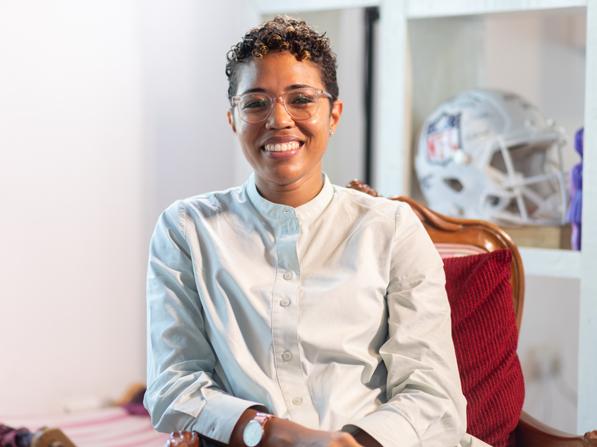
its impact across Africa, competing globally, and inspiring a new generation of creative entrepreneurs.
Beyond business success, Frances envisions a future focused on storytelling, cultural preservation, and global dialogue. Her mantra of self-belief, adaptability, and community impact underscores her journey’s ethos.
Frances’s parting message resonates with embracing diversity, challenging norms, and embracing individuality. Her story encapsulates the essence of blending heritage, entrepreneurship, and a relentless pursuit of excellence.
In essence, Frances Quarcoopome’s journey epitomizes the fusion of cultures, entrepreneurial spirit, and the transformative power of embracing one’s roots. Her narrative serves as a beacon of inspiration for aspiring entrepreneurs and advocates of cultural heritage worldwide.
control, but you can just control how you show up and how you navigate in the world and being focused more on people.
when you focus on the money, the money doesn’t come. When you focus on doing something that you want to do, that’s when you sort of attract the thing that you want to attract.
Frances’ Homecoming Advice
• First, understand why you’re coming. Have your why be as clear as possible.
• Understand that you’re swapping certain things. While you might constantly have Water, electricity etc. in the UK, you might not have that here. But you’ll have great weather, you might be able to afford a nanny if you have kids, you’ll have your family around for support.
• Don’t come with pre-conceived notions of how things should be. Be open to what Africa has to teach you.
• You’ll need to learn a different language (way of doing things) to get what you want done.
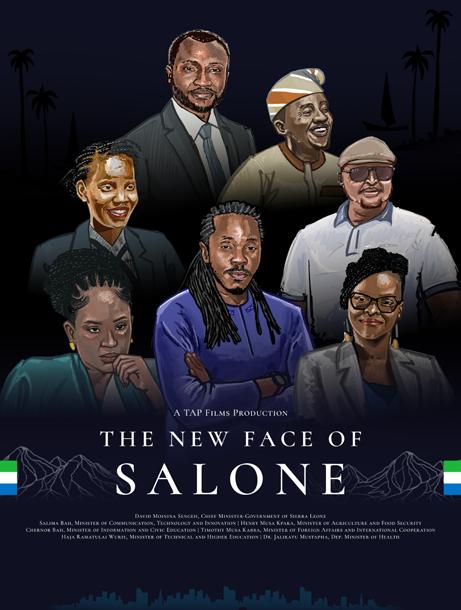
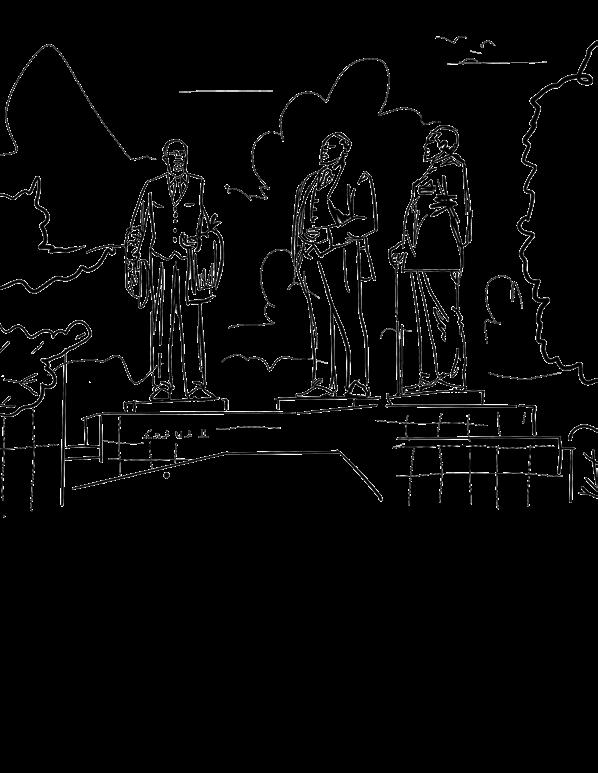
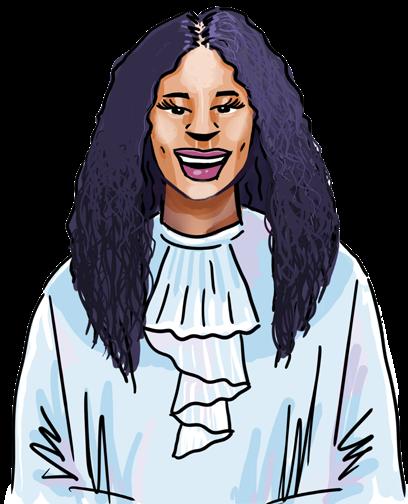
Champane Dr.Kelly
From Botswana to the World and Back: Dr Kelly on Bridging Critical Gaps in Healthcare Services
Dr. Kelebogile Pretty Champane, affectionately known as Dr. Kelly, epitomizes the fusion of passion, perseverance, and purpose in her journey from Botswana to Australia and back again.
A family medicine specialist with a penchant for aesthetics and dermatology, her professional accolades are matched only by her commitment to community service and leadership.
Growing up in FrancisTown, Botswana, Dr. Kelly imbibed resilience and determination from her single mother, who raised her and her siblings with unwavering values.
Her academic journey led her to the University of Botswana before earning a scholarship to pursue medicine at Monash University in Australia. The experience abroad was transformative, exposing her to advanced medical practices and a vibrant multicultural environment.
Returning home amidst the COVID-19 pandemic, Dr. Kelly faced both familiar and unexpected challenges.
Cultural nuances and professional dynamics demanded adaptation, yet her resolve remained unyielding.
She soon after realized her dream of establishing the Premium Medical Center in Botswana, aimed at bridging critical gaps in healthcare services, especially in family medicine and dermatology. For number’s sake, there’s less than 10 professional family doctors in the entire country.
Dr. Kelly’s advice echoes her own experiences: the journey may be arduous, but the rewards of contributing to one’s homeland are immeasurable. With a supportive network and a spirit of openness, she encourages fellow healthcare professionals to embrace the call to serve in Africa.
For her, there’s no greater fulfillment than working alongside her own people, making a tangible difference where it matters most. Here is an interview excerpt from our recent chat with Dr Kelly.

Please Introduce yourself to the TAP Fam.
My name is Dr. Kelebogile Pretty Champane, but most people call me Dr. Kelly. Champane. I’m a family medicine specialist by profession but I also have a special interest in aesthetics and dermatology. I grew up in Botswana, specifically a town called Francis Town. My father passed away when I was very young, so I was raised by a single mum, a very strong woman who instilled a lot of principles and values in my siblings and I.
I spent all my schooling in Francistown, then I went to University of Botswana where I got a scholarship from the Government of Botswana to pursue medicine at Monash University in Australia.
As a young girl growing up in FrancisTown, what were some of your fondest moments?
My favorite moments growing up in Francis town was that I spent a lot of quality time with my family. I also remember doing alot of leadership work in my school as a head girl. So that was a pretty exciting part of my journey as a child. I’ve always been a leader from a young age.
What was your experience like in Australia?
From the moment I arrived, within four months, I had my 21st birthday and I had about 200 people attending that birthday and those were mostly a lot of Australians. So I got off the ground running. That’s how much of a social butterfly I was. And so it was quite interesting and quite fun for me. That said, studying medicine in Australia was quite an experience because I hadn’t had any experience outside studying in Botswana before I left.
The hospitals that I was working at had a lot of advanced equipment that I’d never seen before. Every sector had a lot of specialists in each particular study. It was quite the exposure and it helped me see medicine in a completely new light. It also helped that medical students and professionals at all levels in Australia have brilliant benefits and make a decent living. Because of this, I was able to travel to five continents and 50 countries overall.
It sounds all rousey, did you encounter any challenges and how did you address them?
Medical school is an intense and often stressful journey, with high rates of depression, anxiety, and sadly, suicide among doctors. Going through that experience, alone, away from family and with very little support was tough.
But coming from Botswana, where I excelled as one of the top students in the country, transitioning to a system where English isn’t my first language posed significant hurdles. Processing questions and formulating responses in a language that wasn’t native often led to moments of self-doubt. The rapid pace of discussions sometimes left me struggling to keep up, impacting my academic self-esteem.
One of the other challenges was, you know, as a black person, being black in a predominantly Caucasian or white society is that you always feel that you have to work two to three times as hard as the Caucasian person in order for you to be recognized as the same. Professionally. Because when people see you, they see the color of your skin and already they don’t associate black with excellence. However, in terms of challenges, the toughest aspect of this whole journey was being away from family. It was very lonely.
What was the experience working abroad as a doctor Then?
Once I graduated from medical school, I worked for six years and part of those six years included four years of specialty training, which is specializing to be a specialist family medicine physician. After that, I went into private practice. It was good, you know, it had a lot of support in almost every place that I went to. And of course the financial remunerations were pretty good. But also a lot of opportunities for extra curricular activities. I did a lot of community work and was part of a lot of organizations.
I was a mentor for one of the programs that was mentoring African students living in Melbourne. I was also volunteering for HIV/AIDS Victoria. I did a lot of work with Vision Australia as well, in medical school and even after medical school, the hospitals that I worked in, I was part of the leadership group as well because I’ve always loved leadership.
Tell us about your homecoming Journey
It’s actually an interesting one. When I left Botswana, I always knew I was going to come back. I felt like a soldier who was going for training to go and train, to armor myself and then come back and fight. I was going out there to equip myself with all the skills that I will possibly need in order to come back home and give back to my people. And that’s how my homecoming journey started. Before I’d even left.
I gave myself exactly ten years to return back to Africa. That was the plan. And in those ten years, I studied medicine, specialized. So after a total of what turned out to be 11 years of arming myself, I knew I was ready to come back home permanently.
How did your family take the news that you’re coming home?
My family received the news very well, especially my mother who was more excited than anybody because I had just spent 11 years away from home. I missed a lot of quality time with my mum and my siblings and my extended family. So the thought of me finally being back home was very exciting.
My friends and colleagues in Australia were questioning the decision, asking are you sure you really want to go back to Botswana? You’re going to struggle with this and this and that. They mentioned a lot of things I’ll probably struggle with, but they could also see that I was dead set on it and they knew that it was my calling to go back and So they respected my decision and supported me all the way. And even up to today, they still do support my decision to come back home.
Do you remember what your first day back home was like?
Returning to Botswana amid the COVID-19 pandemic brought unexpected challenges and reflections. After a
mandatory 14-day quarantine, I stepped into a reality that was both familiar and startlingly different. Despite my frequent visits, the cultural shock was profound, revealing how much I had evolved. My principles, values, and outlook on life had shifted, and navigating daily interactions felt like a mental battle.
The lack of the warm customer service I had grown accustomed to in Australia was stark, replaced by palpable frustration and anger, often stemming from economic challenges. The experience was eye-opening, highlighting the complexities of returning home in turbulent times.
How did you find the working environment in Botswana?
Once I relocated back to Botswana I hit the ground running with all the work that I wanted to do for the community but I found the environment was very different from what I was used to previously. So that also came as a huge shock. I was used to a very supportive work environment, here they don’t seem to be as supportive in a lot of places as they could be. I felt a bit of a culture shock and how did I address that? I’m still trying to get used to it.

But interestingly enough, it’s only now, after about two years, that I’m only getting comfortable in this space and being comfortable with how situations are.
The first two years were a lot more rough and harder, a couple of tears and frustrations here and there. But the biggest secret and the best thing is to have a very supportive network around you.
The support from my mum and my family made me survive and to become much more used to the environment and to be more content, more happier. But It didn’t happen instantly.
How did the idea of a Premium Medical Centre come about?
A centre that offers Premium Medical In Botswana is something I had envisioned for a very long time when I was still in Australia. Botswana has a gap in almost every field in the medical space, a need for all types of specialties, and there’s a huge need for all types of healthcare professionals and providers.
I told myself I’d like to have a medical practice back home that can have multiple health providers in one place and also be able to help reach out to our community in every level possible. So I set up and founded a medical practice.
It’s called Premium Medical Center. It’s a ten room facility that offers quite a wide range of medical services.
We have a family medicine physician, a dermatologist general practitioner, and an aesthetics medical practitioner. We also have an in-house nurse, we have a dentist, a physiotherapist. We also have an in-house pharmacy so it’s quite a nice complex where we can provide a little bit of everything in one area.And it’s been an exciting journey so far.
Any specific advice for healthcare professionals thinking of moving back?
For healthcare professionals eyeing a return to Africa, know that your skills are desperately needed here. The shortage of medical professionals across the continent, from rural to urban areas, underscores the significance of your contribution. While financial remuneration may vary, the investment in giving back to your community is immeasurable.
I encourage utilizing your time overseas to equip yourself with knowledge and skills that will be beneficial upon your return. This preparation will enable you to make a more significant impact and navigate challenges with confidence.
Ultimately, there’s no substitute for the fulfillment of working in your homeland. The sense of belonging and purpose found in serving your own people surpasses any other experience. Embrace the journey with optimism, knowing that your efforts
will make a meaningful difference where it matters most— back at home.
If you were asked to decide on moving back again, would you?
I would 1000% times over, with no doubt in my mind and body. Because it’s been absolutely priceless being back home in a lot of ways, a lot of learning, a lot of growth and a lot of fulfillment. It’s been such a beautiful experience.
What are some of your aspirations, what does the future hold for Dr. Champane?
My aspirations are to one day become a minister of health and eventually the president of Botswana. It’s always been my dream that I will continue to do leadership roles in my community.
What would be your advice to anyone thinking of coming back to Africa?
For those contemplating a return to their homeland, my advice is simple yet profound:
• Take the leap. If the desire, determination, and passion to make the move exist within you, embrace it with courage and move, because the experiences gained are invaluable.
• Ensure you have a robust support system in place back home as the adjustment period can be challenging.
• Lower your expectations and maintain an open mind. This is crucial. Every place has its unique dynamics, so be prepared for differences and embrace new experiences without hesitation. This adaptability is key to thriving upon your return.

WE MOVe African
Stuhler Dr.Wanjiru
Dr.Wanjiru Stuhler’s
Rediscovery Journey
In the bustling heart of Nairobi, Dr. Wanjiru Stuhler’s story begins. Born and raised in the vibrant streets of Kenya’s capital, Dr Wanjiru paints for us a picture of a simple childhood filled with joys and close-knit community bonds.
“The best thing about growing up in Nairobi,” she reflects, “is appreciating the little things.” From buying maize on street corners to walking to school with friends, every moment was imbued with a sense of warmth and connection.
As she navigated her formative years in Nairobi, Dr. Stuhler shares that from an early age, she always dreamt of becoming a doctor. “I always wanted to be a doctor,” she recalls, her eyes alight with memories of childhood aspirations.
“And orthodontics seemed like a natural fit.” Her passion for becoming an orthodontist,a dentist who has received special training to learn how to move teeth and jaws, was driven by her love for people and her innate desire to help others, setting her on a path of academic excellence and professional fulfillment.

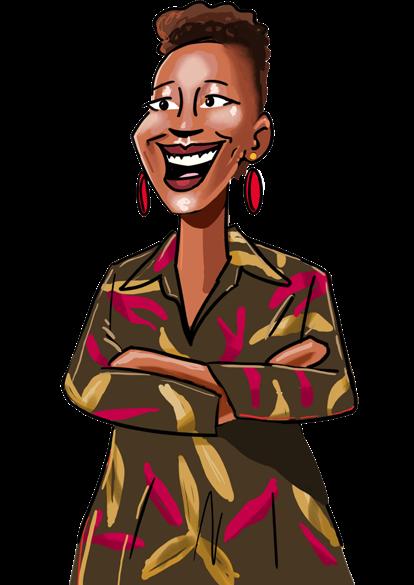
Choosing Orthodontics Dream
Driven by her passion for medicine and fueled by her academic prowess, Dr. Stuhler embarked on a journey that would lead her to Germany, a land of opportunity and new horizons. “I remember sitting in that flight, as an 18 year old, my first time on a flight,” she reminisces, “and thinking to myself, you’ve gotten this opportunity. You have to make use of it.”
Arriving in Germany was a transformative experience for Dr. Stuhler. “It was big,” she recalls, “but I was determined and focused.” The transition to a new culture, language, and way of life was not without its challenges, but her resilience and dedication propelled her forward.
An Odyssey Abroad: Embracing Germany
The first impressions of Germany left an indelible mark on Dr. Stuhler’s memory. “It was very organized, very clean,” she describes. “Almost sterile, too bright, too white, too clean, and very organized.” Despite the initial culture shock, she immersed herself in the German way of life, embracing the opportunities that lay ahead.
“ I was on a mission and what was happening anywhere else or with anyone else was irrelevant. I wanted to learn German. I wanted to speak the language. I wanted to be a doctor and everything else was secondary. I quickly noticed if I don’t speak German and if my German is not good enough, I will not make it. So my first aim was to learn how to speak the language.
So I did that with a cassette. Those days we had Walkmans and cassettes. I would listen and repeat the sentences. Then I would have a small computer where I tried English words and I’d get the translation so that I can shop alone and I can do things alone”.
Soon after, doors opened and working as a dental assistant in Germany opened doors to a wealth of resources and training opportunities. “I got an opportunity at a dental office. I shadowed the doctor and his dental assistant the whole morning,” she recounts, “and in the afternoon, I took over.” The structured environment and access to cutting-edge dental technology enriched her skills and broadened her perspective.
Navigating New Frontiers
Despite the opportunities in Germany, Dr. Stuhler felt a growing sense of longing for home. “The thought of coming back started growing,” she shares, reflecting on the pull of family and a desire for balance. As her professional journey evolved, so did her dreams of returning to Kenya, where she could contribute her skills and knowledge to her community.
The decision to return to Kenya was met with anticipation and excitement. “The highlight of my homecoming story so far has been finding my purpose,” she affirms, emphasizing the fulfillment she experiences in contributing to her community.
As a beacon of inspiration, Dr. Stuhler’s journey underscores the transformative power of following one’s dreams and embracing challenges with resilience.
Starting a New Chapter back home
Returning to Kenya marked a new chapter in Dr. Stuhler’s life. “Integrating was quite fast,” she shares, highlighting the seamless transition back to her roots. With a strong support system of family and friends, she embraced Kenyan life with renewed purpose and enthusiasm.
Her role as an orthodontist in Nairobi not only allowed her to practice her passion but also to give back to the community she holds dear. “One of the main reasons I came back is to give my skills and knowledge of orthodontics to Kenyans, there’s only 13 orthodontics in Kenya, a country of over 50 million people” she emphasizes, highlighting the importance of contributing to the healthcare landscape in her homeland.
Embracing Challenges and Finding Purpose
Dr. Stuhler’s journey serves as a testament to resilience, determination, and the transformative power of following one’s dreams. Her advice to those contemplating a similar path is simple yet profound: “Please do come back to Africa, because we only have this one life to live.”
In her narrative; we find a reminder that home is not just a place but a feeling of purpose and belonging.
Dr. Stuhler’s story resonates as a beacon of inspiration for those seeking fulfillment and purpose in their own paths, showcasing the beauty of embracing challenges and finding meaning in every step of the journey.
Dr Wanjiru’s Homecoming Advice
• If you’ve always wanted to come back. Please come. We only have this one life to live and you don’t want to live with regrets.
• With everything I had going on in Germany, it was only until I moved back that I found my purpose. Make the jump, you might also find yours.
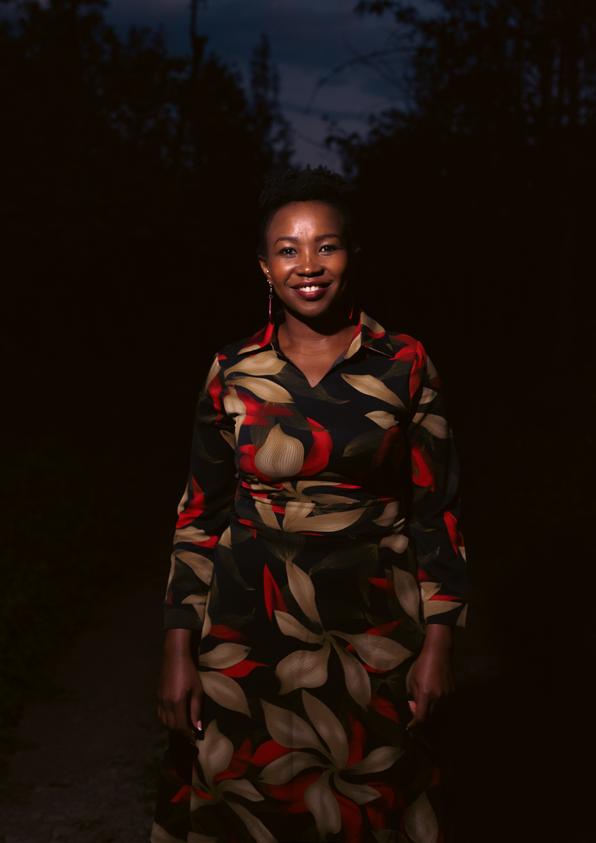
Sabine Matsheka
Embracing Roots, Building MARU
In the heart of Botswana’s lush landscapes lies a tale of rediscovery and transformation—a story that begins with a whisper carried by the wind.
From her childhood, Sabine Matsheka’s world has been a tapestry of cultures woven together by her parents’ heritage.
Born in Belgium, Sabine embraced her environment from an early age while soaking in the diversity of the countries she called home. From bustling cities to serene countrysides, Sabine’s childhood was a mosaic of experiences that shaped her worldview.
From her college years, Sabine’s wanderlust truly took flight. She embarked on a journey of education and exploration, earning her master’s degree and immersing herself in new cultures. The world became her classroom, each encounter a lesson in resilience and adaptability.
Yet, amidst the excitement of new adventures, a quiet longing tugged at Sabine’s heartstrings. She found herself yearning for the familiar embrace of family and the comforting cadence of her native language. Setswana. It was a longing that grew stronger with each passing year, a whisper that beckoned her to return to her roots.

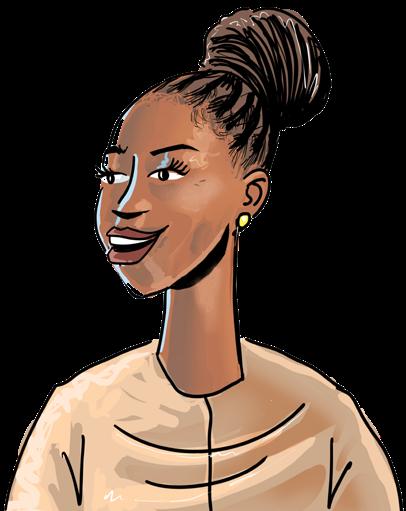

The turning point came in 2019. It was during this time, a time of transition and deep introspection that the whisper became a resolute call—a call to come home.
“I remember the moment vividly,” Sabine recounts, her voice tinged with nostalgia. “It was a blend of apprehension and excitement, a feeling of coming full circle.”
The decision to move back home wasn’t without its challenges. Sabine grappled with the uncertainties of returning to an unknown “home” after years of freely venturing into the unknown. Yet, deep within her, a sense of purpose blossomed—a desire to reconnect with her roots and contribute to her homeland in meaningful ways.
As Sabine embarked on her homecoming journey, she was met with a mix of reactions from friends and family. Some applauded her decision, recognizing the value of reconnecting with one’s cultural heritage. Others voiced concerns about potential challenges and urged her to explore opportunities abroad.
“It was a blend of emotions,” Sabine reflects. “But at the core of it all was a sense of belonging, a feeling that I was where I was meant to be.”
One of the initial hurdles Sabine faced upon her return was reacquainting herself with her native language. Having grown up in a multilingual environment, she found herself struggling to express herself with the fluency she once had. It was a humbling experience—one that fueled her determination to embrace her cultural identity fully.
“I immersed myself in language lessons, eager to reclaim a part of myself that had faded over the years,” Sabine shares. “It was a journey of rediscovery—one that brought me closer to my roots.”
Birthing MARU
It was during this period of introspection that Sabine’s creative spark reignited. With time at her disposal, she delved into her passion for sustainable fashion—a seed planted long ago, now ready to bloom.
MARU, Sabine’s brainchild, emerged as a testament to her love for Botswana’s natural beauty and her commitment to sustainability. The brand’s ethos revolved around locally sourced organic fabrics, intertwining nature-inspired designs with cultural motifs.
“The concept of MARU had been brewing in my mind for years,” Sabine reveals. “It was a dream born out of a desire to blend fashion with sustainability, to create something meaningful and timeless.”
The early days of MARU were filled with excitement and challenges. Sabine worked tirelessly, collaborating with local artisans and designers to bring her vision to life. Each garment bore the imprint of Botswana’s rich heritage, a tribute to the land that had shaped her family’s identity.
As MARU gained traction, Sabine’s passion for cultural appreciation blossomed further. Collaborations with organizations such as the Khoisan People’s Museum in Cape Town brought MARU’s designs to new heights, merging fashion with storytelling.
“One of the highlights of our journey was partnering with the museum to design uniforms inspired by indigenous art,” Sabine recalls. “It was a celebration of heritage and a testament to the power of collaboration.”
Today, MARU stands as a beacon of Sabine’s homecoming journey—a journey that transcended personal boundaries and embraced the richness of cultural heritage. Through MARU, Sabine continues to weave a narrative of sustainability, creativity, and connection—a story that resonates with those who, like her, seek to bridge the past with the present.
For Sabine, homecoming wasn’t just about physical relocation—it was about rediscovering a part of herself that had been waiting to bloom.
As she gazes out at Botswana’s breathtaking landscapes, Sabine sees not just a land of beauty but a canvas of endless possibilities—a canvas that MARU continues to paint with threads of sustainability, culture, and passion.
Sabine’s Homecoming Reflections
Looking back on her journey, Sabine offers advice to fellow young Africans in the diaspora contemplating a return to their roots.
• It’s important to approach the homecoming journey with an open heart and a willingness to embrace both the challenges and the joys.
• Connect with your cultural heritage, immerse yourself in the community, and let your journey unfold organically.”



